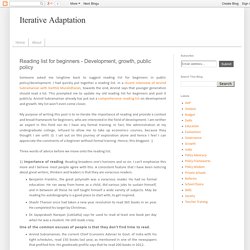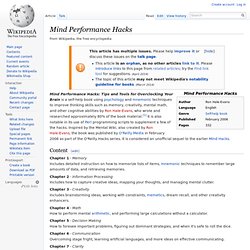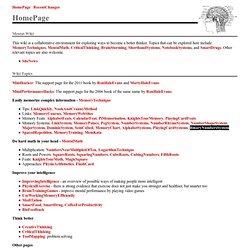

From Average to Greek God - Step by Step Transformation. Grammar Check. Edge.org. Reading list for beginners - Development, growth, public policy. Someone asked me longtime back to suggest reading list for beginners in public policy/development.

I had quickly put together a reading list. In a recent interview of Arvind Subramanian with Karthik Muralidharan, towards the end, Arvind says that younger generation should read a lot. This prompted me to update my old reading list for beginners and post it publicly. Arvind Subramanian already has put out a comprehensive reading list on development and growth. My list won't even come closer.My purpose of writing this post is to re-iterate the importance of reading and provide a context and broad framework for beginners, who are interested in the field of development. One of the common excuses of people is that they don't find time to read. Arvind Subramanian, the current Chief Economic Adviser to Govt. of India with his tight schedules, read 150 books last year, as mentioned in one of the newspapers that profiled him.
So, clearly, lack of time can't be any excuse. 1) Philosophy Prof. Urbanomics. The Learning Toolbox Student Directions. The Learning Toolbox - Cornell Notes. Businessinsider. Tighten Your Belt, Strengthen Your Mind. Men's Journal Magazine - Men's Style, Travel, Fitness and Gear.
I hate the gym.

At least, I hate "the gym" as imagined by the modern American health club: the mindless repetitions on the weight machines, halfhearted crunches, daytime TV during the treadmill. Such a sad, unimaginative excuse for a life, when I could be out rock-climbing, surfing, or, hell, even just scrubbing the bathroom floor. But I love working out the way I've come to understand it, and two big discoveries made all the difference. First, I realized that we all live in a kind of Fitness Fog, a miasma of lies and misinformation that we mistake for common sense, and that makes most of our gym time a complete waste. Muscle withers away if you're not constantly building it, and muscle withers faster as a man ages.
Not that I haven't wasted time at the gym like everybody else, sweating dutifully three times a week, "working my core," throwing in the odd after-work jog. We're not innocent. Shawn Achor: The happy secret to better work. Energy Economics. Buy Eqbal Ahmad: Confronting Empire Book Online at Low Prices in India. Books That Make You Smarter. Mind Performance Hacks. Mind Performance Hacks: Tips and Tools for Overclocking Your Brain is a self-help book using psychology and mnemonic techniques to improve thinking skills such as memory, creativity, mental math, and other cognitive abilities by Ron Hale-Evans, who wrote and researched approximately 80% of the book material.[1] It is also notable in its use of Perl programming scripts to supplement a few of the hacks.

Inspired by the Mentat Wiki, also created by Ron Hale-Evans, the book was published by O'Reilly Media in February 2006 as part of the O'Reilly Hacks series. It is considered an unofficial sequel to the earlier Mind Hacks. Content[edit] Chapter 1 - Memory Includes detailed instruction on how to memorize lists of items, mnemonic techniques to remember large amounts of data, and retrieving memories. Chapter 2 - Information Processing Includes how to capture creative ideas, mapping your thoughts, and managing mental clutter. References[edit] External links[edit] UPDATED: These 167 Documentaries Will Expand Your Mind.
Mentat Wiki: Home Page. This wiki is a collaborative environment for exploring ways to become a better thinker.

Topics that can be explored here include MemoryTechniques, MentalMath, CriticalThinking, BrainStorming, ShorthandSystems, NotebookSystems, and SmartDrugs. Other relevant topics are also welcome. SiteNews Wiki Topics Mindhacker: The support page for the 2011 book by RonHaleEvans and MartyHaleEvans. MindPerformanceHacks: The support page for the 2006 book of the same name by RonHaleEvans.
Easily memorize complex information - MemoryTechnique Do hard math in your head - MentalMath Improve your intelligence Think better Other pages What is a Wiki? A wiki is a web site built collaboratively by a community of users. Feel free to add your own content to this wiki. The Mentat Wiki is powered by Oddmuse, and hosted by the Center for Ludic Synergy.